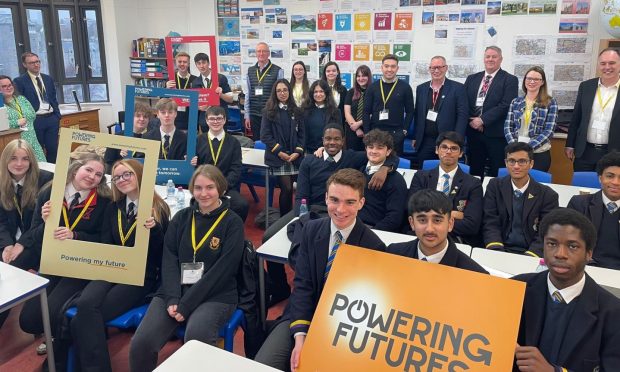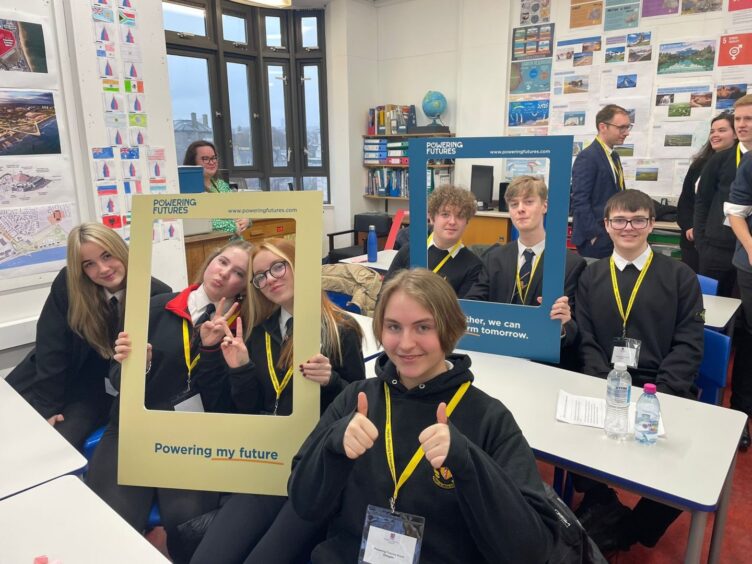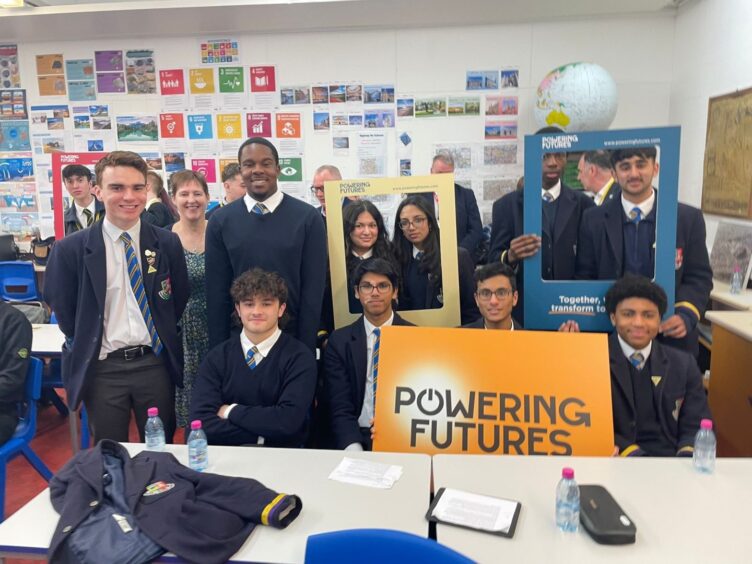Pupils from across the north-east got the chance to present their ideas tackling a real-world problem to industry professionals this week.
Youngsters from Robert Gordon’s College, Mackie Academy and the Gordon Schools participated in the Powering Futures project.
The school kids took on problems ranging from excess food waste in schools, the lack of accessible EV charging points and online disinformation about climate change.
After 30 weeks the groups were challenged to present the solution they came up with to the panelists — made up of industry representatives.
Mackie Academy pupils thrived presenting to new people
Fifth-year Mackie Academy pupil Amy Reid was part of the group tackling online disinformation.
Her group pitched a fact-checking website, aimed at young people, that would publish the truth about climate change.
Amy found presenting in front of people she had never met, and in a new place, to be a “valuable experience”.
She said: “It was great to be a part of something that allowed us to meet pupils at other schools who had also done the Powering Futures course.
“It was nerve-wracking, but a valuable experience.”
Her classmate, and fellow team member, Libby Nicoll agreed that she enjoyed the experience.
Libby said: “It was interesting to see everyone else’s ideas for their challenge statements, and it was also good to see how sustainable practices can be used in the workplace.”
Panelists impressed with pupil presentations
Ewan Wallace, head of environment and sustainability at Aberdeenshire Council, was one of the panelists at the event.
He said: “I was delighted to come along given the topic of environment and sustainability and looking at the changes that could be made in the future.
“And I’m always keen to hear what the younger people in society are thinking about it all.”
Ewan has even asked The Gordon Schools group to discuss their idea about transforming school food waste into fuel with his team.
Balmoral Group project engineer Lee Salisbury was also one of the event panelists. Lee, who volunteers at the Energy Institute Young Professionals Network, was left impressed by the level of detail the kids included in their presentations.
He added: “It’s crazy, 30 weeks is short for real-world problems no one has solved. For them to come up here and be so positive and confident and delighted with these solutions, fair play to them.”
School kids give MSPs ‘food for thought’
MSPs Kevin Stewart and Gillian Martin also attended the event to hear what the fifth and sixth-year pupils had to say.
They listened to two of the presentations and were involved in the discussions after.
Mr Stewart explained that he believes companies and organisations should be inspiring young people to think about what they want to do with their futures, and what the jobs may be.
He said: “I think that’s particularly relevant here in the north-east with the economic change that we’re going to face, the fact that we need to move forward with a just transition. What we have seen today is young folk here thinking about that, rising to the challenge, and making their mark.
“No matter what jobs they choose to go into in the future, climate change has an impact on all of us, and we all have to think about that future.”
Ms Martin agreed with her fellow MSP and said it was interesting to hear about what the pupils wanted to do after school.
She finished: “We don’t have all the answers, and we heard young people thinking about two particular areas they thought there should be more work done in.
“It certainly gives us food for thought in our jobs as well.”
What is the Powering Futures challenge?
Powering Futures brings young people closer to industries and the skills that will power the future.
The organisation currently runs the SCQF level 6 course in 43 schools across Scotland — with 643 secondary pupils taking part this year.
The children are given real-world problems from organisations like Scottish Water, Newsquest, and British Gas to choose from and are challenged to come up with a solution.
RGU architect student Skye Chatburn participated in the programme last year while taking a year out of university to work in the industry.
While she was only involved for 16 weeks, she said the course helped her become interested in sustainability. Skye has now turned her focus to sustainability in architecture.
Not only do they gain a qualification from the course, but they also get the opportunity to learn teamwork and presenting skills.
Find out more about Powering Futures, or getting, involved here





Conversation